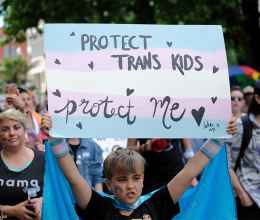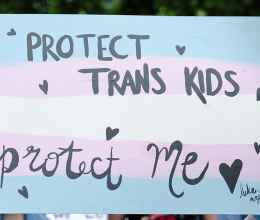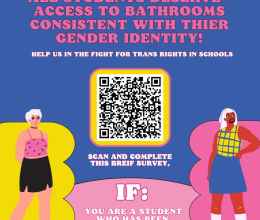
Committee approval of the Texas-style private enforcement bill comes the day after the House approved a total abortion ban.
OKLAHOMA CITY — Today, the Oklahoma House Committee on Public Health approved S.B. 1503, a bill banning abortion at roughly six weeks, modeled on Texas S.B. 8. The ban now moves to the full House for approval, which could come as soon as this week. Gov. Kevin Stitt has pledged to sign any abortion bill that reaches his desk. S.B. 1503 would take effect immediately upon his signature and ban virtually all abortions at around six weeks of pregnancy, before many people know they are pregnant. This would eliminate access not only for the more than 900,000 women of reproductive age — plus more people who can become pregnant — living in Oklahoma, but for the thousands of people who have turned to the state for care in the wake of Texas’s unprecedented abortion ban. S.B. 1503 has already passed the full Senate.
The House committee’s approval of the six-week abortion ban comes just a day after the full House approved S.B. 612, sending it to Gov. Stitt’s desk. A total abortion ban, S.B. 612 would take effect this summer and make providing abortion a felony punishable by up to 10 years in prison and a $100,000 fine. Legislators passed the total ban, a holdover from last year of session, as hundreds of reproductive justice, rights, and health supporters rallied on the steps of the state capitol. Throughout legislative session, lawmakers have blocked public testimony on a slew of abortion restrictions.
Statement from Tamya Cox-Touré, executive director, ACLU of Oklahoma:
“It is no surprise that Oklahoma politicians are continuing to push an anti-abortion agenda almost daily with little regard to the basic rights of their constituents and the need of our communities for essential health care. People should be able to control their own bodies, lives and futures, without shame or stigma. If lawmakers really cared about our communities, they would expand access to quality reproductive health care instead of restricting it. The ACLU of Oklahoma envisions a state that respects and supports each of us in making the deeply personal decisions that determine the shape of our lives, including whether, when, and how to have children, and we will never stop fighting to ensure everyone can get the care they need.”
Statement from Emily Wales, interim president, Planned Parenthood Great Plains Votes:
“In case it wasn’t already clear: anti-abortion lawmakers are hellbent on banning abortion in Oklahoma as much as possible, as soon as possible. They have refused to listen to Oklahomans even as we rally at the Capitol building and chanted ‘bans off Oklahoma’ outside their offices. Well, we won’t stop holding them accountable for taking our freedoms. Planned Parenthood and our partners will continue fighting this ban, and for the people of Oklahoma.”
Statement from Rebecca Tong, co-executive director, Trust Women:
“It is incredibly disheartening to see the Oklahoma State Legislature double-down on cruel and discriminatory anti-abortion legislation in a moment when so many people are desperately seeking relief. SB 1503, like SB 8, is not only a bad law–it is a reckless and malicious policy that is guaranteed to result in poorer health outcomes for people seeking routine and essential health care, and the further unnecessary and immoral criminalization of pregnant people. Trust Women’s Oklahoma City clinic will continue to provide care to as many people as we can, for as long as we are able. Abortion care is community care, and we will support our communities.”
Statement from Rev. T. Sheri Dickerson, Oklahoma Call for Reproductive Justice:
“"The passage of SB 1503 out of the House Public Health Committee today cements the bullying efforts of the Oklahoma State Legislature by threatening people into carrying unwanted or unviable pregnancies against their will, while also tying the hands of providers and advocates. Oklahomans deserve better and should not have to flee the state for essential medical care. All Oklahomans should have the support and resources we need to raise healthy families and build thriving communities. Deciding if and when to grow our families is one of the most important decisions we make in life, and access to a full spectrum of reproductive health care, including abortion care, is essential. At OCRJ, we will continue to fight for the dignity and humanity of people seeking abortion care by raising awareness and educating people about abortion care, tackling misinformation and stigma, and offering love and compassion."
In addition to S.B. 1503 and S.B. 612, the legislature is still considering:
- H.B. 4327, a total abortion ban with a Texas-style private enforcement mechanism.
- S.B. 1553, a ban on abortion 30 days after a person’s last menstrual period, when few people know they are pregnant;
- S.B. 1555, a modification of the state’s trigger ban that would allow pre-Roe v. Wade statutes to take effect if the Supreme Court overturns Roe v. Wade, even in part, and asserts that the state could enforce a total ban;
- S.J.R. 37, a constitutional amendment that would eliminate any right to abortion in Oklahoma;
- S.J.R. 17, a constitutional amendment that would confer full personhood — and the rights that come with it — from conception;
- S.B. 1552, a bill funding fake clinics that lie to people seeking abortion.
If any abortion ban goes into effect in Oklahoma, it will be devastating for the region’s abortion access network. Oklahoma has been a lifeline for Texans seeking abortion after the state passed its near-total abortion ban. Since that ban took effect more than six months ago, some Oklahoma abortion providers have seen roughly a 2,500% increase in patients from Texas. Nearly half of all Texans who obtained an abortion out-of-state in the last six months traveled to Oklahoma.
Under these bans, abortion patients would be forced to travel even further distances for health care that they should be able to receive in their own communities. For many Oklahomans who already face barriers to health care due to systemic racism and discrimination — especially Black, Latina, or Indigenous people; 2SLGBTQ+ people; those who live in rural communities; or who have low incomes — abortion could be pushed out of reach entirely, with devastating consequences for their long-term health and well-being.





